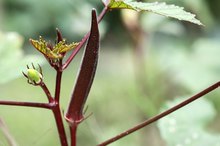Herbs to Shrink Colon Polyps
Colon cancer may occur in people with colon polyps, a condition that may lead to cancer 1. To diagnose colon cancer, your doctor may recommend a colonoscopy, a procedure that takes a look inside the colon and allows a gastroenterologist to remove colon polyps if present while you are under general anesthesia 1. Most gastroenterologists recommend a routine colonscopy after age 50; earlier, if you have a family history of colon cancer or are symptomatic 1. Many people choose herbs to shrink colon polyps instead of conventional treatment. However, herbs' safety and effectiveness are not scientifically proven. Check with your doctor before taking herbs.
If you are experiencing serious medical symptoms, seek emergency treatment immediately.
Garlic
Due to its antioxidant properties, garlic may be a beneficial adjunctive therapy in patients with colon cancer 1. Identified phytochemicals in garlic include allicin and allicin-derived organo-sulfur compounds such as diallyl disulfide may have very potent properties in reducing colon polyps by blocking nutrients such as glucose and oxygen, according to Stephen Fulder, author of "The Garlic Book: Nature's Powerful Healer. 2"
Green Tea
The Side Effects of Colon Clenz
Learn More
Green tea comes from the leaves of the Camellia sinensis plant. It has an inhibitory effect on human colon cancer cell lines, says Herbal Safety 1. However, clinical trials are needed to determine true efficacy. Studies suggest that epigallocatechin-3-gallate, an active constituent of green tea, neutralizes enzymes aiding in the growth of colon polyps. To reap this benefit, you must drink at least 5 cups of green tea everyday.
- Green tea comes from the leaves of the Camellia sinensis plant.
- It has an inhibitory effect on human colon cancer cell lines, says Herbal Safety 1.
Flax Plant
Flax plant is a member of the Linaceae family, with the scientific name Linum usitatissimum. The seeds are used medicinally. The anti-carcinogenic properties of flaxseeds are attributed to the high concentrations of alpha-linolenic acid, an omega-3 fatty acid, which appears to protect against colon cancer, according to the South Dakota State University 1.
- Flax plant is a member of the Linaceae family, with the scientific name Linum usitatissimum.
- The anti-carcinogenic properties of flaxseeds are attributed to the high concentrations of alpha-linolenic acid, an omega-3 fatty acid, which appears to protect against colon cancer, according to the South Dakota State University 1.
Considerations
Supplements to Help the Spleen
Learn More
Herbs may help shrink colon polyps, however, they are not intended to replace conventional cancer therapies 1. In addition, herbs may reduce the effectiveness of some anti-cancer medications. If you have cancer, you should not use herbs without first talking to your doctor.
Related Articles
References
- Pubmed Health: Colon Cancer
- "The Garlic Book: Nature's Powerful Healer"; Stephen Fulder; 1997
- University of Maryland Medical Center: Green Tea
- South Dakota State University: SDSU research: Flax in the Diet Means Fewer Tumors
- American Cancer Society. Key Statistics for Colorectal Cancer. Updated January 8, 2020.
- American Cancer Society. Colorectal Cancer Risk Factors. Updated February 21, 2018.
- Centers for Disease Control and Prevention. Colorectal Cancer Awareness. Updated February 12, 2020.
- Siegel RL, Fedewa SA, Anderson WF, et al. Colorectal cancer incidence patterns in the United States, 1974-2013. J Natl Cancer Inst. 2017;109(8). doi:10.1093/jnci/djw322
- National Cancer Institute. Obesity and Cancer
- Peeters PJ, Bazelier MT, Leufkens HG, De vries F, De bruin ML. The risk of colorectal cancer in patients with type 2 diabetes: associations with treatment stage and obesity. Diabetes Care. 2015;38(3):495-502. doi:10.2337/dc14-1175
- Kim BJ, Yang SK, Kim JS, et al. Trends of ulcerative colitis-associated colorectal cancer in Korea: A KASID study. J Gastroenterol Hepatol. 2009;24(4):667-71. doi:10.1111/j.1440-1746.2008.05730.x
- Andersen NN, Jess T. Has the risk of colorectal cancer in inflammatory bowel disease decreased?. World J Gastroenterol. 2013;19(43):7561-8. doi:10.3748/wjg.v19.i43.7561
- Children's Oncology Group. Health Link: Healthy Living After Treatment of Childhood, Adolescent, and Young Adult Cancer. October 2018.
- Desautels D, Czaykowski P, Nugent Z, Demers AA, Mahmud SM, Singh H. Risk of colorectal cancer after the diagnosis of prostate cancer: A population-based study. Cancer. 2016;122(8):1254-60. doi:10.1002/cncr.29919
- Strafford JC. Genetic testing for Lynch syndrome, an inherited cancer of the bowel, endometrium, and ovary. Rev Obstet Gynecol. 2012;5(1):42-9.
- U.S. National Library of Medicine. MedlinePlus. Peutz-Jeghers syndrome. Updated October 26, 2017.
- Sinha R, Cross AJ, Graubard BI, Leitzmann MF, Schatzkin A. Meat intake and mortality: a prospective study of over half a million people. Arch Intern Med. 2009;169(6):562-71. doi:10.1001/archinternmed.2009.6
- World Cancer Research Fund. Limit red and processed meat. 2018.
- American Cancer Society. Can Colorectal Cancer Be Prevented?. Updated May 30, 2018.
- Citronberg JS, Hardikar S, Phipps A, Figueiredo JC, Newcomb P. Laxative type in relation to colorectal cancer risk. Ann Epidemiol. 2018;28(10):739-741. doi:10.1016/j.annepidem.2018.06.011
- Aykan NF. Red meat and colorectal cancer. Oncol Rev. 2015 Feb 10;9(1):288. doi:10.4081/oncol.2015.288
- Botteri E, Iodice S, Bagnardi V, Rajmondi S, Lowendels AB, Maisonneuve P. Smoking and colorectal cancer: a meta-analysis. JAMA. 2008 Dec 17;300(23):2765-78. doi:10.1001/jama.2008.839
- Children's Oncology Group. (2013). Long-Term Follow-Up Guidelines for Survivors of Childhood, Adolescent, and Young Adult Cancers. 2013.
- Citronberg J, Kantor ED, Potter JD, White E. A prospective study of bowel movement frequency, constipation, and laxative use on colorectal cancer risk. Am J Gastroenterol. 2014 Oct;109(10):1640-49. doi:10.1038/ajg.2014.233
- Desautels D, Czaykowski P, Mugent Z, Demers AA, Mahmud SM, Singh H. Risk of colorectal cancer after the diagnosis of prostate cancer: A population-based study. Cancer. 2016 Apr 15;122(8):1254-60. doi:10.1002/cncr.29919
- Kim ER, Chang DK. Colorectal cancer in inflammatory bowel disease: The risk, pathogenesis, prevention and diagnosis. World J Gastroenterol. 2014 Aug 7;20(29):9872-81. doi:10.3748/wjg.v20.i29.9872
- Swede H et al. Baseline serum C-reactive protein and death from colorectal cancer in the NHANES III cohort.Int J Cancer. 2014 Apr 15;134(8):1862-70. doi:10.1002/ijc.28504
Writer Bio
Henry Pitot has been writing since 1992. His work has appeared in leading peer-reviewed journals, including "The Lancet" and Cancer Research Online. He is certified in oncology and hematology by the American Board of Internal Medicine. He received his Doctor of Medicine from University of Wisconsin in 1986.








